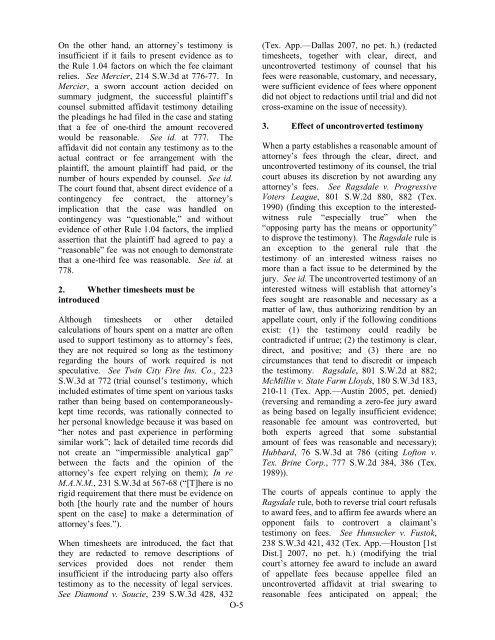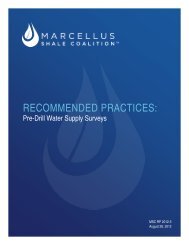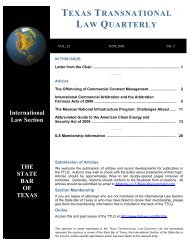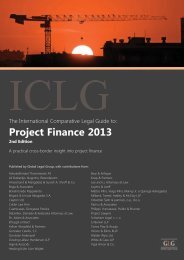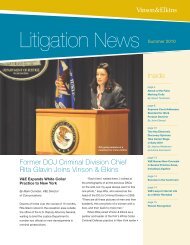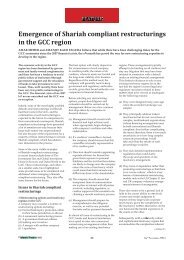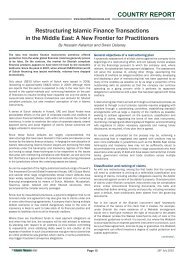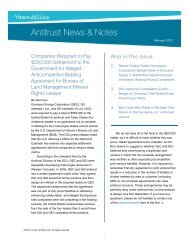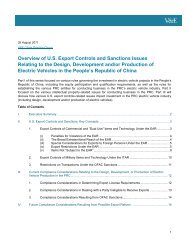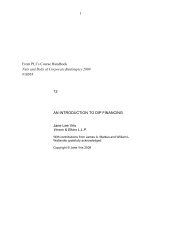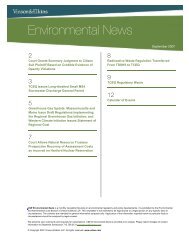Attorney's Fees Update - Vinson & Elkins LLP
Attorney's Fees Update - Vinson & Elkins LLP
Attorney's Fees Update - Vinson & Elkins LLP
Create successful ePaper yourself
Turn your PDF publications into a flip-book with our unique Google optimized e-Paper software.
On the other hand, an attorney’s testimony is<br />
insufficient if it fails to present evidence as to<br />
the Rule 1.04 factors on which the fee claimant<br />
relies. See Mercier, 214 S.W.3d at 776-77. In<br />
Mercier, a sworn account action decided on<br />
summary judgment, the successful plaintiff’s<br />
counsel submitted affidavit testimony detailing<br />
the pleadings he had filed in the case and stating<br />
that a fee of one-third the amount recovered<br />
would be reasonable. See id. at 777. The<br />
affidavit did not contain any testimony as to the<br />
actual contract or fee arrangement with the<br />
plaintiff, the amount plaintiff had paid, or the<br />
number of hours expended by counsel. See id.<br />
The court found that, absent direct evidence of a<br />
contingency fee contract, the attorney’s<br />
implication that the case was handled on<br />
contingency was “questionable,” and without<br />
evidence of other Rule 1.04 factors, the implied<br />
assertion that the plaintiff had agreed to pay a<br />
“reasonable” fee was not enough to demonstrate<br />
that a one-third fee was reasonable. See id. at<br />
778.<br />
2. Whether timesheets must be<br />
introduced<br />
Although timesheets or other detailed<br />
calculations of hours spent on a matter are often<br />
used to support testimony as to attorney’s fees,<br />
they are not required so long as the testimony<br />
regarding the hours of work required is not<br />
speculative. See Twin City Fire Ins. Co., 223<br />
S.W.3d at 772 (trial counsel’s testimony, which<br />
included estimates of time spent on various tasks<br />
rather than being based on contemporaneouslykept<br />
time records, was rationally connected to<br />
her personal knowledge because it was based on<br />
“her notes and past experience in performing<br />
similar work”; lack of detailed time records did<br />
not create an “impermissible analytical gap”<br />
between the facts and the opinion of the<br />
attorney’s fee expert relying on them); In re<br />
M.A.N.M., 231 S.W.3d at 567-68 (“[T]here is no<br />
rigid requirement that there must be evidence on<br />
both [the hourly rate and the number of hours<br />
spent on the case] to make a determination of<br />
attorney’s fees.”).<br />
When timesheets are introduced, the fact that<br />
they are redacted to remove descriptions of<br />
services provided does not render them<br />
insufficient if the introducing party also offers<br />
testimony as to the necessity of legal services.<br />
See Diamond v. Soucie, 239 S.W.3d 428, 432<br />
O-5<br />
(Tex. App.—Dallas 2007, no pet. h.) (redacted<br />
timesheets, together with clear, direct, and<br />
uncontroverted testimony of counsel that his<br />
fees were reasonable, customary, and necessary,<br />
were sufficient evidence of fees where opponent<br />
did not object to redactions until trial and did not<br />
cross-examine on the issue of necessity).<br />
3. Effect of uncontroverted testimony<br />
When a party establishes a reasonable amount of<br />
attorney’s fees through the clear, direct, and<br />
uncontroverted testimony of its counsel, the trial<br />
court abuses its discretion by not awarding any<br />
attorney’s fees. See Ragsdale v. Progressive<br />
Voters League, 801 S.W.2d 880, 882 (Tex.<br />
1990) (finding this exception to the interestedwitness<br />
rule “especially true” when the<br />
“opposing party has the means or opportunity”<br />
to disprove the testimony). The Ragsdale rule is<br />
an exception to the general rule that the<br />
testimony of an interested witness raises no<br />
more than a fact issue to be determined by the<br />
jury. See id. The uncontroverted testimony of an<br />
interested witness will establish that attorney’s<br />
fees sought are reasonable and necessary as a<br />
matter of law, thus authorizing rendition by an<br />
appellate court, only if the following conditions<br />
exist: (1) the testimony could readily be<br />
contradicted if untrue; (2) the testimony is clear,<br />
direct, and positive; and (3) there are no<br />
circumstances that tend to discredit or impeach<br />
the testimony. Ragsdale, 801 S.W.2d at 882;<br />
McMillin v. State Farm Lloyds, 180 S.W.3d 183,<br />
210-11 (Tex. App.—Austin 2005, pet. denied)<br />
(reversing and remanding a zero-fee jury award<br />
as being based on legally insufficient evidence;<br />
reasonable fee amount was controverted, but<br />
both experts agreed that some substantial<br />
amount of fees was reasonable and necessary);<br />
Hubbard, 76 S.W.3d at 786 (citing Lofton v.<br />
Tex. Brine Corp., 777 S.W.2d 384, 386 (Tex.<br />
1989)).<br />
The courts of appeals continue to apply the<br />
Ragsdale rule, both to reverse trial court refusals<br />
to award fees, and to affirm fee awards where an<br />
opponent fails to controvert a claimant’s<br />
testimony on fees. See Hunsucker v. Fustok,<br />
238 S.W.3d 421, 432 (Tex. App.—Houston [1st<br />
Dist.] 2007, no pet. h.) (modifying the trial<br />
court’s attorney fee award to include an award<br />
of appellate fees because appellee filed an<br />
uncontroverted affidavit at trial swearing to<br />
reasonable fees anticipated on appeal; the


